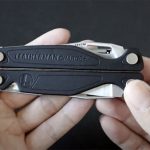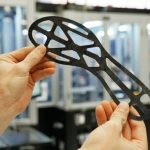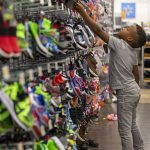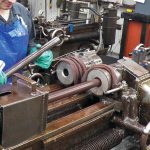S&P Global Ratings lowered the debt ratings of Newell Brands Inc., parent of Coleman, Marmot, Ex Officio, Stearns, Bubba and Contigo and other consumer brands, due to the company’s exposure to weakening discretionary demand for its products and incremental costs from announced tariffs.
S&P said it expects the tariffs to pressure profit margins and result in S&P Global Ratings-adjusted leverage remaining above 5x through 2025.
As a result, S&P Global Ratings lowered its long-term issuer credit rating on Newell Brands to ‘B+’ from ‘BB-‘. The ‘B’ commercial paper rating was affirmed..
S&P also lowered its issue-level rating on the company’s unsecured notes to ‘B+’ from ‘BB-‘. The recovery rating remains ‘3’ (50 percent-70 percent; rounded estimate: 55 percent), indicating S&P’s expectations of meaningful recovery in the event of a payment default.
The stable outlook reflects that Newell will be able a offset a portion of topline and tariff pressure with the productivity, pricing, commodity, and input cost inflation easing it is expecting in the coming year.
Newell’s other major brands include Rubbermaid, Sharpie, Graco, Rubbermaid Commercial Products, Yankee Candle, Paper Mate, FoodSaver, Dymo, Expo, Elmer’s, Oster, Nuk, Spontex, and Campingaz.
S&P said in its analysis, “We believe demand for the company’s discretionary product portfolio will remain weak, given the pressure of higher tariffs and weakening economic conditions in 2025. Newell’s net sales declined by 5.3 percent in the first quarter of 2025 after a 7 percent decline in 2024 due to lower demand globally, loss from business exits, and unfavorable foreign currency headwinds. We expect demand headwinds will persist in 2025 due to its discretionary product range including Rubbermaid, Sharpie and Yankee Candle. In addition, the company’s focus on exiting smaller brands to optimize its product portfolio and unfavorable foreign currency headwinds impact will continue in 2025. As a result, we forecast revenue to decline by 7.5 percent in 2025, before returning to modest growth in 2026.
“We expect that S&P adjusted leverage will remain above 5x in 2025, after solid progress toward deleveraging in 2024. Newell finished 2024 with leverage at 5.2x (compared with our forecast of 5.7x in 2024 and its 6.5x in fiscal 2023), due to its better-than-expected free operating cash flow (FOCF) generation. Over the past several quarters, the company saw sequential declines in leverage. In the latest 12 months ended in the first quarter leverage increased to 5.5x, partly when considering some seasonal borrowing.
“We believe S&P adjusted leverage will remain above 5x in the coming year. We also forecast the company will generate modest free operating cash flow (FOCF) by our reported calculations of about $80 million, which will be less than half 2024 levels. Newell has $1.23 billion of senior unsecured notes outstanding due on April 1, 2026. If the company fails to refinance substantially all this debt maturity over the next few months, we could lower the rating. This remains a key credit risk, in our opinion.
“Newell has a robust U.S. manufacturing base but still is prone to tariff-related downside. Newell has been implementing a tariff mitigation strategy for several years, investing nearly $2 billion in its U.S. manufacturing since 2017. The company says more than half of 2024 U.S. sales were manufactured through a North America supply base and are not subject to tariffs. Imports from other countries accounted for about 24 percent of its total cost of goods sold (COGS), with China accounting for 15 percent, Mexico 5 percent, and the remainder other countries. We note 98 percent of its imports from Mexico are exempt from tariffs under the United States Mexico Canada Agreement (USMCA).
“The company has taken various actions to mitigate the impact, which include targeted price increases, effective management of discretionary overhead and promotional spending and transition of suppliers to other countries, which is further supported by lower raw material (resins) and transportation costs. The company took tariff-related price actions in the U.S.
“We believe these measures will enable the company to offset the incremental costs from tariffs in 2025, but at the expense of lower volume growth amid declining consumer sentiment. We will also be monitoring closely how baby gear is treated in this round of tariffs and if any will be excluded like in the last round. We are monitoring the China tariff situation and believe that if the tariffs were to be implemented at 125 percent, it could negatively affect gross margins by nearly 150 basis points (bps) and result in leverage in the high-5x area, assuming the company is able to pass through some portion of the additional costs to consumers.
“S&P Global Ratings believes there is a high degree of unpredictability around policy implementation by the U.S. administration and possible responses–specifically with regards to tariffs–and the potential effect on economies, supply chains, and credit conditions around the world. As a result, our baseline forecasts carry a significant amount of uncertainty. As situations evolve, we will gauge the macro and credit materiality of potential and actual policy shifts and reassess our guidance accordingly (see our research here: spglobal.com/ratings).
“The stable outlook reflects that progress in improving credit metrics in the past year can provide cushion to profit pressure from volume pullbacks amid potential price increases in the coming year.”
Image courtesy Marmot
















